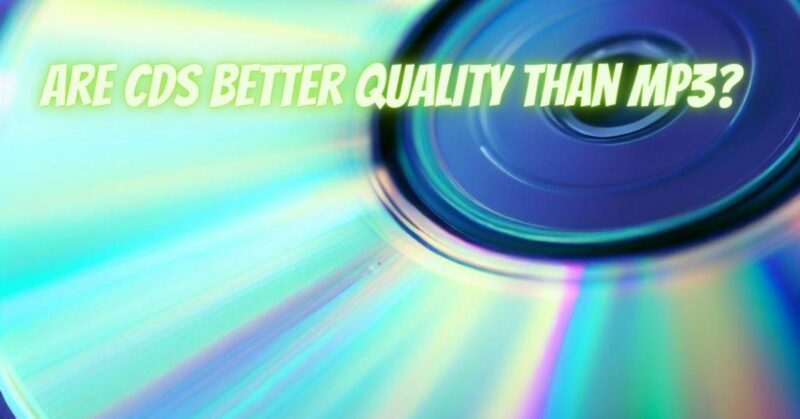The debate between CD audio quality and MP3 files has been a long-standing one in the world of digital music. Audiophiles and music enthusiasts often find themselves pondering which format offers superior sound quality. In this article, we’ll dissect the differences between CD audio and MP3 files, exploring the factors that impact their respective sound quality and helping you make an informed choice based on your listening preferences.
CD Audio Quality:
Compact Discs (CDs) have long been regarded as the gold standard for audio quality. Here are some key characteristics that contribute to CD audio’s reputation:
- Lossless Compression: CD audio is encoded in a lossless format, which means no audio data is discarded during the encoding process. This results in an exact reproduction of the original recording.
- Sample Rate and Bitrate: CD audio boasts a sample rate of 44.1 kHz and a bitrate of 1,411,200 bps (1.4 Mbps). This high sample rate captures the full range of human hearing, while the bitrate ensures a wide dynamic range and minimal loss of detail.
- Full Frequency Range: CD audio can reproduce frequencies up to approximately 22 kHz, covering the entire audible spectrum for humans. This results in clear and detailed sound.
- Low Compression Artifacts: With lossless compression, CD audio is virtually free from compression artifacts like audible distortion or loss of audio quality.
MP3 Audio Quality:
MP3 (MPEG-1 Audio Layer 3) is a widely used digital audio format known for its convenience and small file sizes. Here’s how MP3 audio quality compares to CD audio:
- Lossy Compression: MP3 files use lossy compression, which means some audio data is discarded to reduce file size. This compression can result in a loss of audio quality, particularly at lower bitrates.
- Variable Bitrates: MP3 files come in various bitrates, typically ranging from 128 kbps to 320 kbps or higher. Higher bitrates yield better sound quality, but even the highest-bitrate MP3s may not match CD audio quality.
- Frequency Range: MP3s may have a limited frequency range compared to CDs, which can result in reduced detail, especially in the higher frequencies.
- Compression Artifacts: The lossy compression used in MP3 encoding can introduce compression artifacts, such as audible distortion, especially at lower bitrates.
Which Is Superior?
Determining whether CD audio quality is superior to that of MP3 files depends on various factors:
- Listening Environment: In a casual or noisy listening environment, the differences between CD audio and high-bitrate MP3s may be less noticeable. However, in a high-quality audio setup or with attentive listening, CD audio can offer a more faithful reproduction of the original recording.
- Personal Preference: Some listeners may prioritize convenience and portability over slight differences in audio quality. In such cases, MP3 files at higher bitrates may suffice.
- Source Material: The source material matters. If you’re starting with a low-quality recording, the difference between CD audio and MP3 may be less pronounced.
- Storage Considerations: MP3s are a practical choice when storage space is a concern, allowing you to carry more music on portable devices.
In the debate over CD audio quality vs. MP3 files, CD audio is generally considered superior in terms of fidelity and sound quality. However, the practicality and convenience of MP3 files, especially at higher bitrates, make them a popular choice for everyday listening. The choice between CD and MP3 ultimately depends on your priorities, listening environment, and personal preferences. Whether you opt for the pristine sound of CD audio or the convenience of MP3, the most important thing is to enjoy the music you love.


